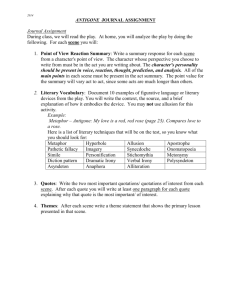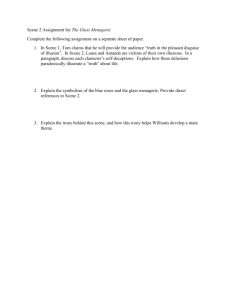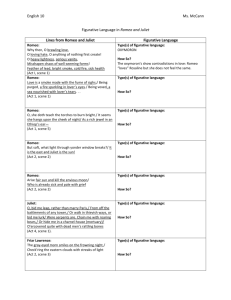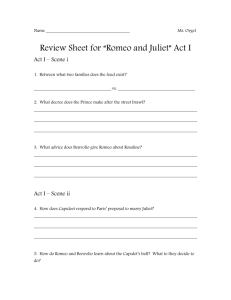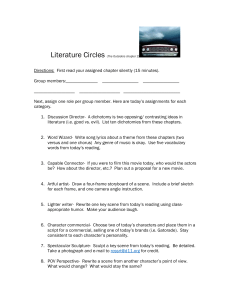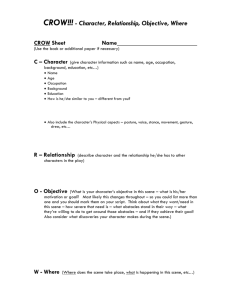Figurative Language
advertisement
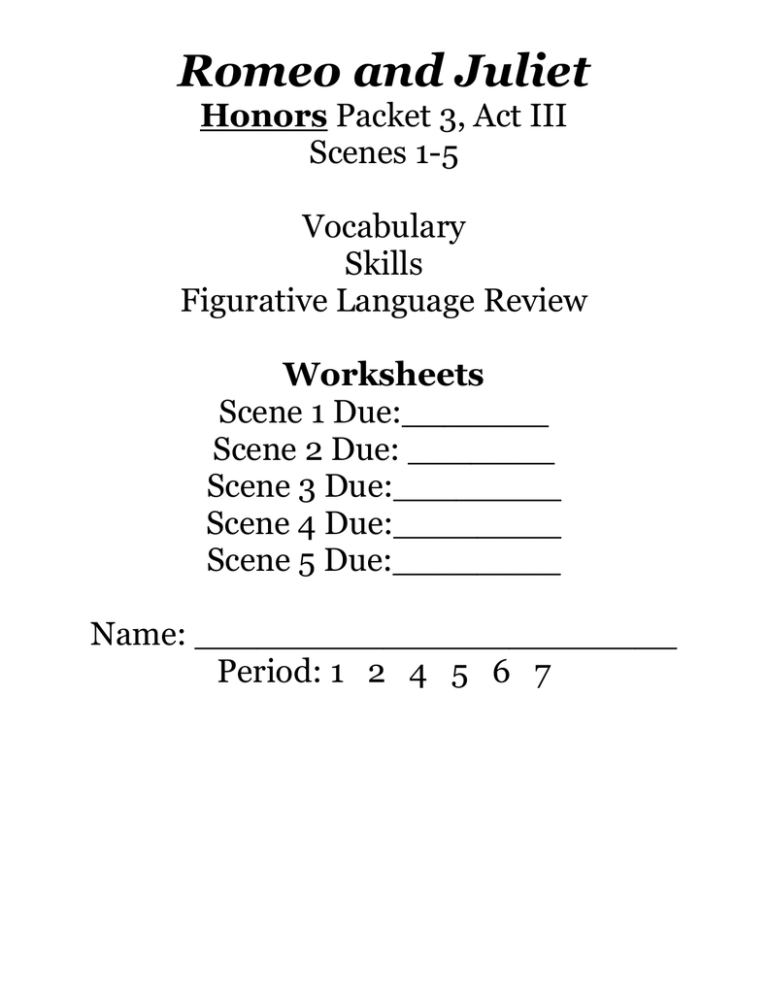
Romeo and Juliet Honors Packet 3, Act III Scenes 1-5 Vocabulary Skills Figurative Language Review Worksheets Scene 1 Due:_______ Scene 2 Due: _______ Scene 3 Due:________ Scene 4 Due:________ Scene 5 Due:________ Name: _______________________ Period: 1 2 4 5 6 7 Vocabulary Word Lament Lurk Revive Stifle Vial Definition Illustration A passionate expression of grief, mourn To wait in a concealed place especially for evil doing To bring back to life or consciousness Suffocate; to make someone be able to breath Small glass or plastic bottle, often used to store medications _____1. Which of the following things might you find in a vial? A. a dog B. a book C. poison Sentence My sister lamented the loss of our pet cat. Romeo lurked beneath Juliet’s balcony after the party. After the accident, the doctors had to revive him since his injuries were very serious. I was almost stifled when my brother locked me in a shed during the middle of summer and wouldn’t let me out for 6 hours. I am so scared of getting shots that if I even see the vial holding the medicine, I faint. D. hope _____2. When the flowers began to wilt, the gardener tried to _____ them by watering them again. A. revive B. stifle C. lament D. lurk 3. What are two reasons why someone might lurk? A.___________________________________________________________ B. __________________________________________________________ 4. Name something that would cause you to lament. _____5. When the boy was locked in the closet, he was almost ____ because it had poor ventilation. A. revived B. stifled C. lamented D. lurked _____6. George found himself in quite a _____ when his car became stuck on the tracks and a train was headed towards him. A. alliance B. protest C. predicament D. anguish 7. What do you think causes both Juliet and Romeo the most of woe? ____8. My mother always tells me to respect anyone who is _____ ; she thinks that family is important. A. gall B. chaste C. foe D. kin _____9. The house ____ to my parents’ house is for sale; there are always people driving by to look at it. A. adjacent B. lurk C. woo D. vile 10. Name one time in the play when Romeo is in peril. _____11. The _____ between the two foes was so great that neither could stand to even hear the other’s name. A. fickle B. rancor C. shrift D. eloquence ____12. I tried to ____ my teacher’s decision to give us homework; however, she gave us work anyway. A. revive B. pernicious C. adjacent D. protest 13. What is something one might do if trying to woo another person? ____14. Which of the following is the best example of retaining? A. giving money to charity C. keeping or saving your birthday money B. doing your homework D. forgetting your book for class Skills: Irony Situational Irony: When an occurrence is the opposite of what is expected. Verbal Irony: When a person says one thing and means another. Dramatic Irony: When the reader knows something the characters do not. Figurative Language Simile Definition Comparing two unlike things using the words like or as Example Tim’s voice booms like the loud speaker. Making a direct comparison of two unlike things The boy is a speeding bullet racing toward the finish line Giving human qualities to nonhuman things. I woke up to the sun smiling down at me. The repetition of constant sounds or letters. The sea shells sang sweet songs. Obvious and intentional exaggeration To wait an eternity A word that imitates the sound it is associated with Buzz, Pow, Zip The continuation of a sentence or phrase from one line of a poem to the next, without a pause between lines. (notice how you read without a pause) Ex: The waves beside them danced; but they Outdid the sparkling waves in glee A rhyme created by two or more words in the same line of verse Dr. Seus wrote in iambic tetrameter. If he had split his lines differently, he would have used enjambment: I do not eat green eggs And ham, I will not eat them, Sam I am It cracked and growled, and roared and howled. A comparison that shows similarities between We hold the silence / tight between Metaphor Personification Alliteration Hyperbole Onamonapia Enjambment* Internal Rhyme* Analogy* Consonance* Assonance* two things that are otherwise dissimilar. A writer may use an analogy to explain something unfamiliar by comparing it to something familiar The repetition of consonant sounds, typically within or at the end of words, that do not rhyme and preceded by different vowel sounds us / like a live wire, / like a strip of gold / torn from a wedding brocade The repetition of same or similar vowel sounds within nonrhyming words. Ex: I’ve been trying / to remember the taste, / but it doesn’t exist A harsh, discordant mixture of sounds About the town the owl could not be found. Cacophony* Euphony* Allusion* Epithet* Metonymy* Archaism* *= Pre-AP term Brick-clock Cannot-recollect “Everywhere was tumult exultation, deafening and maniacal bewilderment, astounding noise, yet furious dumbshow. “The Prisoners!” “The Records!” “The secret cells!” “The instruments of torture!” “The Prisoners!” Of all these cries, and ten thousand incoherencies, “The Prisoners!” was the cry most taken up…” Pleasing or sweet sound; pleasing effect to the ear, especially a pleasant sounding or harmonious combination or succession of words Nature’s first green is gold, / Her hardest hue to hold. / Her early leafs a flower; A reference to a well-known character, place, or situation from history, music, art, or another work of literature. Discovering meaning of an allusion can often be essential to undersanding a work. Ex: Edna St Vincent Millay alludes to Penelope, Odysseus’s wife in the Odyssey, in her poem “An Ancient Gesture”: I thought, as I wiped my eyes on the corner of my apron: / Penelope did this too. “the grey-eyed goddess” is Athena A brief pause used to characterize a person, place, or thing. Rhetoric device or figure of speech in which a thing or concept is not called its own name, but by the name of something closely associated with the concept (can be real or fictional) The use of a form of speech or writing that is no longer current Uncle Sam is a name with which the United States Government is associated and is often used in place of it. Hollywood is a metonym for the US media industry. The word thee is an archaism because it’s old and no longer used Act 3 Scene _____ Summary Quote Analysis Response (character development, theme development, structure analysis, diction/figurative language) Questions and/or Opinion Act 3 Scene _____ Summary Quote Analysis Response (character development, theme development, structure analysis, diction/figurative language) Questions and/or Opinion Act 3 Scene _____ Summary Quote Analysis Response (character development, theme development, structure analysis, diction/figurative language) Questions and/or Opinion Act 3 Scene _____ Summary Quote Analysis Response (character development, theme development, structure analysis, diction/figurative language) Questions and/or Opinion Act 3 Scene _____ Summary Quote Analysis Response (character development, theme development, structure analysis, diction/figurative language) Questions and/or Opinion
